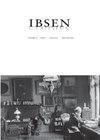Frode Helland and Julie Holledge (editors): Ibsen on Theatre, with new translations of Henrik Ibsen’s writings by May-Brit Akerholt and a foreword by Richard Eyre
IF 0.1
0 THEATER
引用次数: 0
Abstract
Ibsen on Theatre is the third title to be published by Nick Hearn Books in the ...On Theatre Series. It follows Shakespeare on Theatre (2012), edited by Nick de Somogyi, and Chekhov on Theatre (2012), compiled by Jutta Hercher and Peter Urban, with translations by Stephen Mulrine. (n.b. Chekhov on Theatre was published first in Germany in 2004). Ibsen on Theatre (2018) is edited by Frode Helland and Julie Holledge, with translations by May-Brit Akerholt. The premise of ...On Theatre Series is, according to its own tagline, to show “[w]hat the world’s greatest dramatists had to say about theatre in their own words.” (p. ii) This it certainly does, albeit with certain variations of approach across the titles. There is insufficient space here for a detailed comparison of the three but it may be useful to highlight some of these variations. The first concerns language. The ...On Theatre Series is aimed at English-speaking readers so, to state the obvious, whilst the source texts in Shakespeare remain in the original, those in Chekhov and Ibsen are presented in translation. I am a little disappointed that nowhere in Ibsen on Theatre are play titles presented in Norwegian. In Chekhov on Theatre, on the other hand, transliterated Russian versions are offered (“Chaika”, “Dyadya Vanya”, “Tri sestry”, etc. pp. 228–237). The second concerns source materials. Shakespeare left no correspondence so the texts in this volume are drawn primarily from his plays and sonnets, supplemented by dramatic works and reminiscences by others. Chekhov, on the other hand, wrote aFrode Helland和Julie Holledge(编辑):易卜生论戏剧,梅·布里特·阿克霍尔特翻译了易卜生的新作品,理查德·爱作了前言
《易卜生在剧院》是尼克·赫恩出版社在。。。关于戏剧系列。继尼克·德·索莫吉主编的《莎士比亚论戏剧》(2012年)和朱塔·赫彻和彼得·厄本主编的《契诃夫论戏剧》,斯蒂芬·穆林翻译。(《契诃夫戏剧论》于2004年在德国首次出版)。《易卜生在剧院》(2018)由Frode Helland和Julie Holledge编辑,May Brit Akerholt翻译。…的前提。。。根据《戏剧系列》本身的口号,它是为了展示“世界上最伟大的剧作家用他们自己的话对戏剧的评价”。这里没有足够的空间来详细比较这三种情况,但强调其中的一些变化可能会很有用。第一个问题涉及语言。这个《戏剧系列》是针对英语读者的,因此,显而易见的是,虽然莎士比亚的源文本仍然是原作,但契诃夫和易卜生的源文本是翻译的。我有点失望的是,易卜生剧院里没有用挪威语呈现的戏剧名称。另一方面,在契诃夫戏剧中,提供了音译的俄语版本(“Chaika”、“Dyadya Vanya”、“Tri-setry”等,第228–237页)。第二个问题涉及原始材料。莎士比亚没有留下任何信件,因此本卷的文本主要来自他的戏剧和十四行诗,辅以其他人的戏剧作品和回忆。另一方面,契诃夫写了
本文章由计算机程序翻译,如有差异,请以英文原文为准。
求助全文
约1分钟内获得全文
求助全文

 求助内容:
求助内容: 应助结果提醒方式:
应助结果提醒方式:


